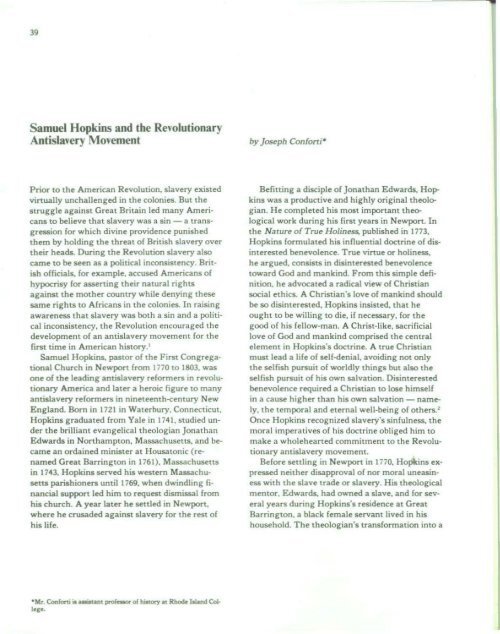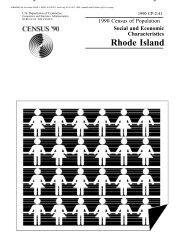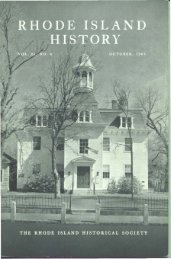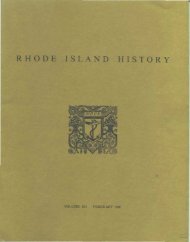RHODE ISLAND HISTORY - Rhode Island Historical Society
RHODE ISLAND HISTORY - Rhode Island Historical Society
RHODE ISLAND HISTORY - Rhode Island Historical Society
- No tags were found...
Create successful ePaper yourself
Turn your PDF publications into a flip-book with our unique Google optimized e-Paper software.
3.Samuel Hopkins and the Revolutionar yAntislavery Movementby J~ph Confoni-Prior to the American Revolution. slavery existedvirtually unchallenged in the colonies. But thestruggle against Great Britain led many Americansto believe that slavery was a sin - a transgressionfor which divine providence punishedthem by holding the threat of British slavery overtheir heads. During the Revolution slavery alsocame to be seen as a political inconsistency. Britishofficials. for example. accused Americans ofhypocrisy for asserting their natural rightsagainst the mother country while denying thesesame rights to Africans in the colonies. In raisingawareness that slavery was both a sin and a politicalinconsistency, the Revolution encouraged thedevelopment of an antislavery movement for thefirst time in American history.'Samuel Hopkins. pastor of the First CongregationalChurch in Newport from 1770 to 1803. wasontoof the leading antislavery reformers in revolutionaryAmt'rica and later a heroic figure to manyantislavery reformers in nineteenth-century NewEngland. Born in 1721 in Watt'rbury. Connecticut.Hopkins graduated from Yale in 1741 , studied underthe brilliant evangelical theologian JonathanEdwards in Northampton, Massachusetts. and becamean ordained minister at Housatonic (renamedGreat Barrington in 1761). Massachusettsin 1743. Hopkins served his western Massachusettsparishioners until 1769, when dwindling financialsupport led him to request dismissal fromhis church. A year later he settled in Newport.where he crusaded against slavery for the rest ofhis lift'.Befitting a disciple of Jonathan Edwards. HoI'kins was a productive and highly original theologian.He completed his most important theologicalwork du ring his first years in Newport. Inthe Nature of True Holiness. published in 1773.Hopkins formulated his influential doctrine of disinterestedbenevolence. True virtue or holiness,he argued. consists in disinterested benevolencetoward God and mankind. From this simple definition,he advocated a radical view of Christiansocial ethics. A Christian's love of mankind shouldbe so disirneresred. Hopkins insisted, that heought to he willing to die, if necessary, for thegood of his fellow-man. A Christ-like, sacrificiallove of God and mankind comprised the centralelement in Hopkins's doctrine. A true Christianmust lead a life of self-denial, avoiding not onlythe selfish pursuit of worldly things but also theselfish pursuit of his own salvation. Disimeresredbenevolence required a Christian to lose himselfin a cause higher than his own salvation - namely,the temporal and eternal well-being of others,"Once Hopkins recognized slavery's sinfulness, themoral imperatives o f his doctrine obliged him tomake a wholehearted commitment to the Revolutionaryantislavery movement.Before St'ttling in Newport in 1770. Hopkins expressedneither disapproval of nor moral uneasinesswith the slave trade or slavery. His theologicalmentor. Edwards. had owned a slave. and (or severalyears during Hopkins's residence at GreatBarrington, a black female servant lived in hishousehold. The theologian's transformation into a·Mr. Conf«ti ia~t prol_ of hiatory at Rhodt- bland ColIeee .











